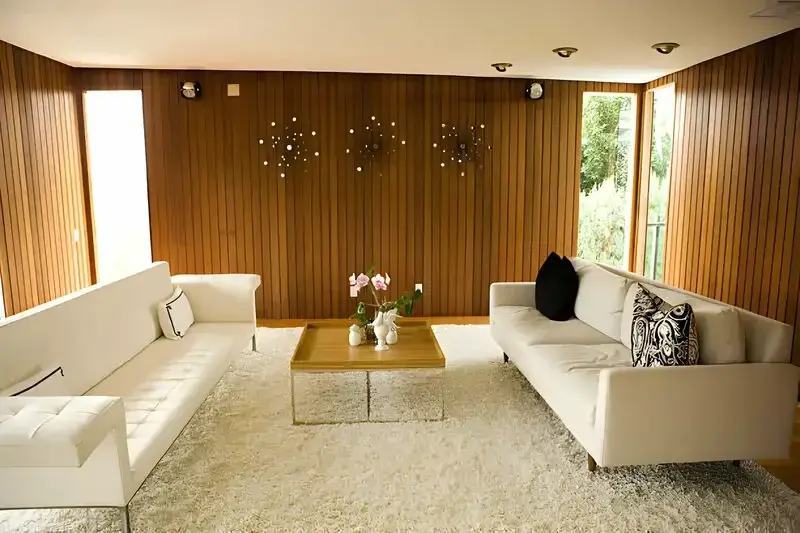How Can You Get a Musty Smell Out of Wood Panelling?

Wood Panelling
Wood paneling can add warmth and character to any room, but sometimes, it comes with an unwanted guest – a musty odor. A musty smell in wood paneling can be off-putting and challenging to eliminate, whether it’s due to age, moisture, or other environmental factors. Fear not! In this guide, we’ll explore effective methods to rid your wood paneling of that unpleasant odor, leaving your space fresh and inviting once again.
Understanding the Cause
Before diving into solutions, it’s essential to understand why wood paneling can develop a musty smell. Several factors contribute to this issue:
- Moisture: Wood is porous and can absorb moisture from the environment. If the paneling is exposed to high humidity or water leaks, it can lead to mold and mildew growth, resulting in a musty odor.
- Lack of Ventilation: Poor ventilation in a room can trap moisture and stale air, exacerbating musty smells in wood paneling.
- Age and Decay: Over time, wood can deteriorate, leading to a breakdown of organic matter and the release of unpleasant odors.
- Environmental Factors: External factors such as temperature fluctuations, seasonal changes, and exposure to sunlight can also impact the condition of wood paneling and contribute to musty smells.
Now that we understand the potential causes, let’s explore effective strategies to eliminate that musty odor and restore the beauty of your wood paneling.
Effective Solutions
Deep Cleaning
- Begin by dusting the wood paneling thoroughly using a soft cloth or vacuum cleaner with a brush attachment. Pay attention to corners, crevices, and grooves where dust and debris may accumulate.
- Next, prepare a cleaning solution by mixing equal parts white vinegar and water. Vinegar is a natural disinfectant and deodorizer, making it an excellent choice for removing musty smells from wood paneling.
- Dampen a clean cloth or sponge with the vinegar solution and wipe down the entire surface of the wood paneling. Allow the solution to sit for a few minutes to penetrate the wood and neutralize odors.
- Rinse the paneling with clean water and dry it thoroughly with a towel or microfiber cloth. Proper drying is crucial to prevent moisture buildup, which can contribute to future musty smells.
Odor Absorbers
- Place bowls of activated charcoal or baking soda throughout the room near the wood paneling. These natural odor absorbers can help eliminate musty smells by trapping odorous molecules in porous materials.
- Alternatively, you can use commercial odor absorbers or air purifiers equipped with activated carbon filters to effectively neutralize odors in the room.
Sunlight and Fresh Air
- If possible, open windows and doors to allow fresh air to circulate through the room. Good ventilation can help dissipate musty odors and prevent moisture buildup.
- Sunlight is a natural disinfectant and deodorizer. Direct sunlight can help kill mold and mildew spores while also drying out the wood paneling. Open curtains or blinds during the day to expose the paneling to sunlight if feasible.
Essential Oils
- Essential oils not only add pleasant aromas to a room but also possess antimicrobial properties that can help combat musty smells.
- Add a few drops of your choice essential oil, such as lavender, tea tree, or lemon, into a spray bottle full of water. Mist the wood paneling lightly, allowing the aroma to disperse throughout the room.
- Alternatively, you can add essential oils to a diffuser or humidifier to continuously release fragrance into the air.
Sealing and Refinishing
- Consider sealing or refinishing the wood paneling if the musty smell persists despite cleaning and deodorizing efforts.
- Sealants such as polyurethane or shellac create a protective barrier that seals in odors and prevents moisture penetration. Be sure to choose a sealant suitable for indoor use and follow the manufacturer’s instructions carefully.
- Refinishing the wood paneling can also help eliminate odors by removing surface contaminants and applying a fresh coat of stain or paint. Choose a low-VOC (volatile organic compound) finish to minimize exposure to harmful chemicals.
Preventive Measures
In addition to treating existing musty smells, it’s essential to implement preventive measures to maintain the freshness of your wood paneling:
- Monitor indoor humidity levels using a hygrometer and use a dehumidifier if necessary to keep humidity levels between 30% and 50%.
- Address any water leaks or moisture issues promptly to prevent mold and mildew growth.
- Regularly dust and clean wood paneling to prevent the accumulation of dust, dirt, and other debris.
- Ensure adequate ventilation in the room by using exhaust fans in bathrooms and kitchens and opening windows when the weather permits.
Conclusion
Banishing musty smells from wood paneling requires a combination of thorough cleaning, odor-absorbing techniques, and preventive measures.
By understanding the underlying causes and implementing effective strategies, you can enjoy the beauty of your wood paneling without the unwanted odor. Remember to be patient and persistent, as eliminating musty smells may take time and effort.
With dedication and the right approach, you can transform your space into a fresh and inviting environment for years to come.
Read Also
Can you put two different wood floors next to each other?
Real Estate Success: The Only Metrics That Matter
For More exciting news, visit: TimesInform










